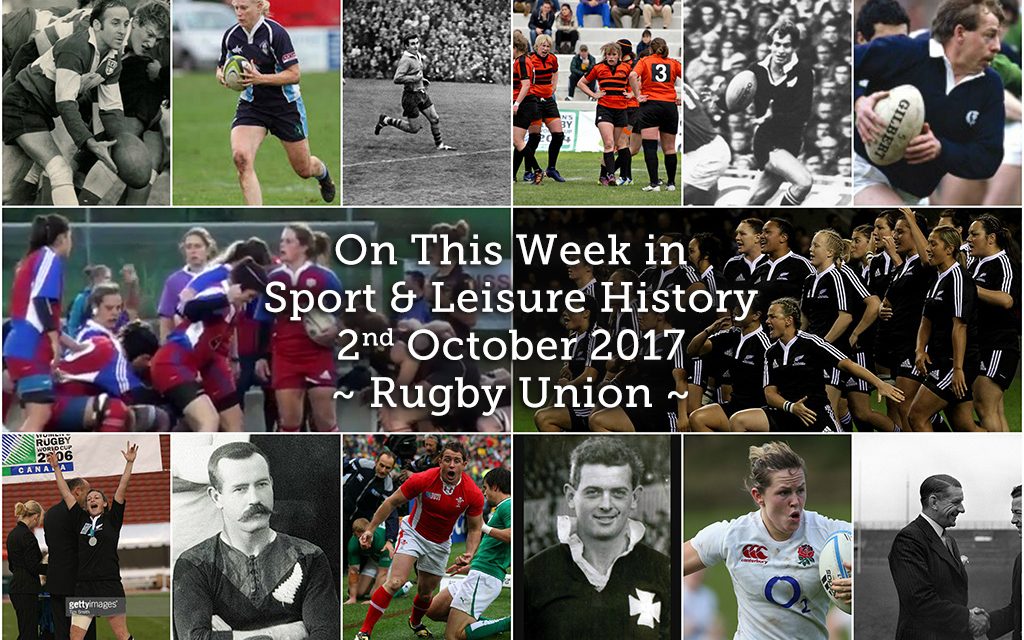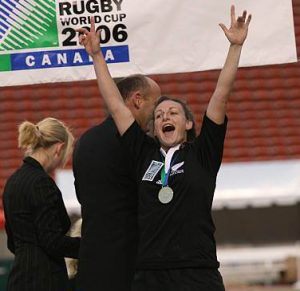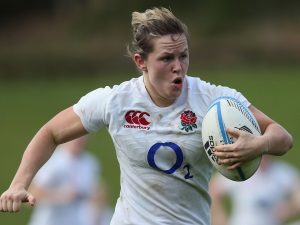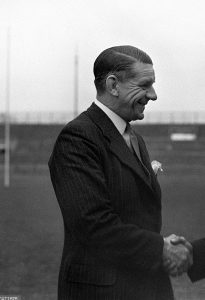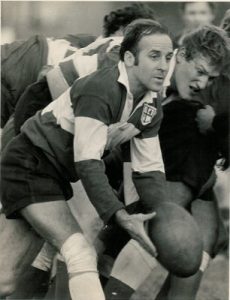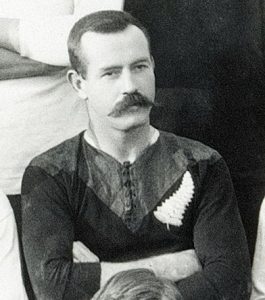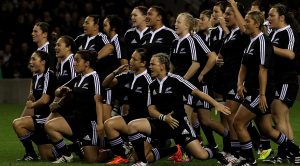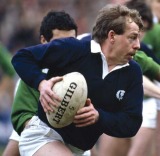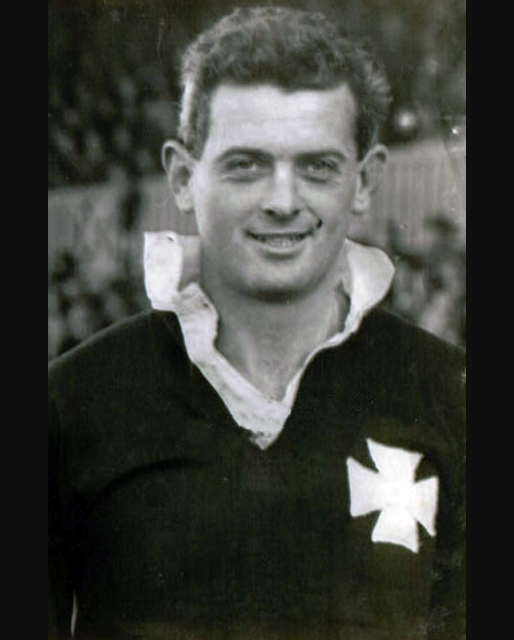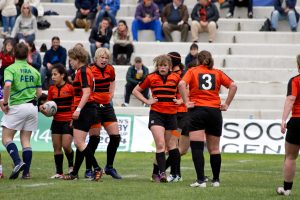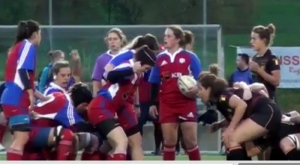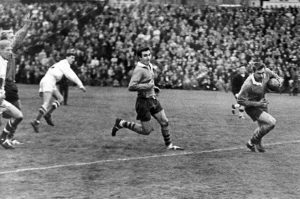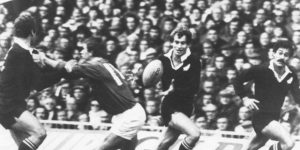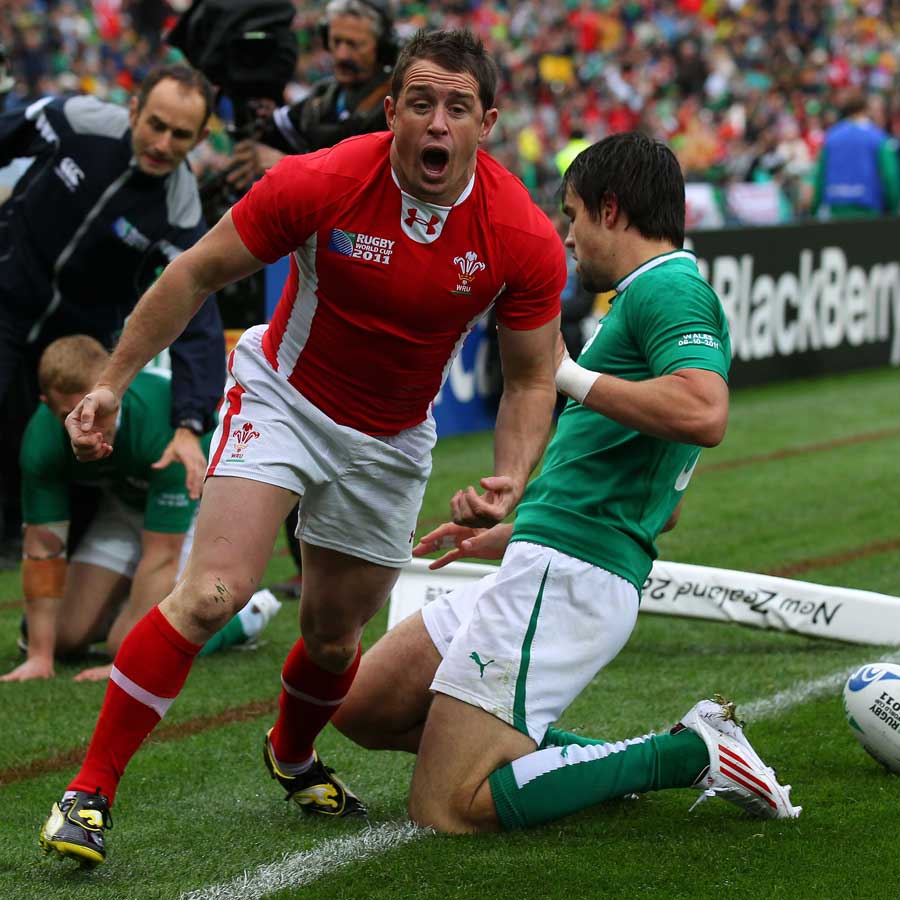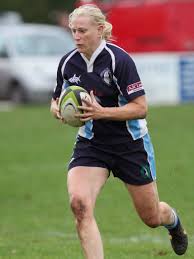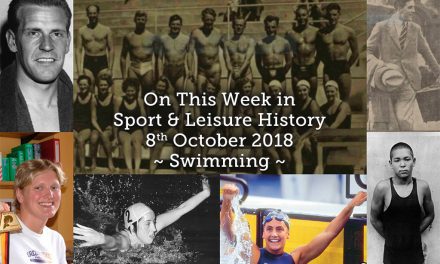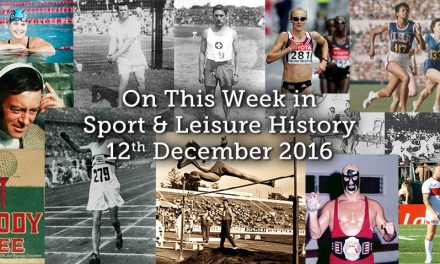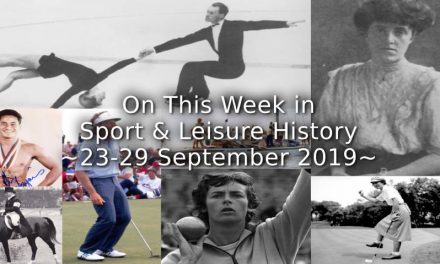2nd -Today in 1909 Harlequins defeated Richmond 14-10 in the first ever match played at Twickenham. The game attracted a crowd of 2,000. The ground hosted its first Test match four months later when England defeated Wales 15-6 in front of a crowd of 18,000. The RFU purchased the plot for £5,500 in 1907, and the first stands were constructed the following year. Before the ground was bought, it was used to grow cabbages, and so Twickenham became known as the ‘Cabbage Patch’. In 1924 The Invincible Second All Blacks battled their way to a 13-10 victory over a strong Newport XV. Today in 1957 Wade Dooley was born. A former England international who played lock forward, he played for his country 55 times and was known as the “Blackpool Tower”, as a result of being 6 feet 8 inches tall and a police officer with Lancashire Constabulary in Blackpool. He played most of his career for Preston Grasshoppers, where he was nurtured by former England international and coach Dick Greenwood. He also had a brief spell with Fylde and with New Brighton. Dooley made his international debut on 5 January 1985 against Romania. He later established a second row partnership with fellow police officer Paul Ackford. In 1987 he broke the cheekbone of Welsh player Phil Davies with a punch during a rough game in Cardiff. Dooley went on the 1989 British Lions tour to Australia, playing in the final two test matches. He was also part of the England team that won back-to-back grand slams in 1991 and 1992.He also went on the 1993 British Lions tour to New Zealand, but left the tour to return home for the funeral of his father. He was replaced on the tour by the young Leicester England lock Martin Johnson, and decided to retire. Today in 1966 The Athletic club in Wellington left New Zealand on an ambitious 11-match world tour which would eventually see them visit Great Britain, Ireland, Hong Kong and Japan. On this day in 1976 Japan were edged out 23-21 by Combined Services at Davenport on their tour of Great Britain and on the same day even the presence of Gerald Davies in the starting line-up was not enough to prevent Cardiff becoming the latest victims of a rapidly improving Argentina side, the Pumas triumphing 29-25 in a thrilling encounter in the Welsh capital. The game was very nearly touched by tragedy, though, as Argentine prop Mario Carluccio lost consciousness with just over ten minutes of normal time remaining. However, Carluccio was resuscitated by Cardiff trainer Tom Holley. Stephanie Mortimer was born in 1981, she played for New Zealand and Canterbury. She was in the squad that won the 2006 Women’s Rugby World Cup. Eight years later in 1989 English international Marlie Packer was born. She was part of the 2014 Women’s Rugby World Cupsquad and began playing rugby at an early age for the Ivel Barbarians. She played fo Bath between 2007 and 2009 with teammate Natasha Hunt, then later joined Bristol. Packer currently plays for Wasps Ladies. She was part of the English squad in the 2013 Rugby World Cup Sevens. She was named in the squad for the 2017 Women’s Rugby World Cup in Ireland. Packer is a plumber by profession and works for a company in her home town. Today in 1990 American rugby union player Kristine Sommer was born. She made her debut for the United States in 2012. She was named in the Eagles 2017 Women’s Rugby World Cup squad.Sommer graduated with a degree in Chemistry from the University of California, Santa Barbara. She plays for the Seattle Saracens. She made he sevens debut for the US sevens team in 2016. Today in 2007 Tongan wing Joseph Vaka was cautioned by police after clashing with an England fan who teased him over his team’s Rugby World Cup defeat. The 18-stone player was travelling home with team-mates after being knocked out of the tournament in the group stages by England in Paris. One witness told The Sun newspaper that the Tongan hit the fan, an airport worker, with his forearm after the man repeatedly chanted “Come on, England”. In 2007 Ireland boss Eddie O’Sullivan was given the dreaded ‘vote of confidence’ by the Irish Rugby Football Union following their group-stage exit from the Rugby World Cup. “We have put our faith in Eddie. We made decisions last May in terms of where we wanted to go over the next four years,” chief executive Philip Browne said. “We’re happy with that decision. In our view he’s the best man for the job.” O’Sullivan left his position following the 2008 Six Nations. Samoa centre Eliota Fuimaono–Sapolu was charged with misconduct by the International Rugby Board after accusing referee Nigel Owens of racism following Samoa’s defeat to South Africa in the 2011 Rugby World Cup pool clash. The defeat, on September 30, saw Samoa eliminated from the competition and the Gloucester centre questioned Welshman Owens’ neutrality with Wales benefiting from a South Africa victory. Elsewhere, the news that all of New Zealand was dreading was finally confirmed: Dan Carter’s World Cup was over, the fly-half having suffered a groin tear in training the day before. “It is devastating for Daniel,” All Blacks coach Graham Henry said. “He has been a world-class player for a long time, probably one of the greatest players ever produced by this country. This was going to be his pinnacle, the Rugby World Cup. We’ve had a lot of focus on this tournament for the last couple of years, and it is devastating he cannot be involved in that.” On the field, Wales booked their place in the knockout stages with a confident performance over Fiji as they banished the memories of 2007 with a commanding 66-0 win. Ireland also made light work of Italy to ensure they were in the quarter-final mix as they prevailed 36-6.
- Stephanie Mortimer
- Marlie Packer
3rd – Today in 1888 New Zealand Natives, a privately organised and mainly Māori rugby team, play their first game in UK; the first national rugby team to wear the silver fern. In 1931 Bennie Osler’s Third Springboks opened their tour of Britain with a 14-3 victory again st Gloucestershire/Somerset Combined at Bristol. The tourists went on to complete South Africa’s second Grand Slam tour with victories over Wales (8-3 at St Helens), Ireland (8-3 at Lansdowne Road), England (7-0 at Twickenham) and Scotland (6-3 at Murrayfield). Osler’s reliance on the boot was criticised both at home and abroad but his tactics were undeniably successful and he remained an enduring influence on a later generation of Springbok fly-halves. On this day in 1962 Doug Prentice, captain of the 1930 Lions to Australia and New Zealand and secretary of the RFU since 1947, died in hospital at the age of 64 after a long illness. Capped three times by England between 1928-30, he had the honour of leading what is recognised as the first British Isles team. The tour included a total of 28 matches, seven in Australia and 21 in New Zealand. Of the 28 games, 24 were against club or invitational teams. The tourists lost their only Test clash with Australia and only claimed one victory in their four-Test series with New Zealand. Four years later in 1966 England fly-half Tom Brophy signed for Barrow RL club. The 24-year-old Rossall chemistry teacher was due to appear in the first England RU trial at the end of the week. Keith Savage scored a try hat-trick for England in their 33-3 tour victory against Ontario in Toronto today in 1967. In 1970, in a special four countries match to launch the RFU’s Centenary England/Wales drew 14-all with Scotland/Ireland in perfect conditions at Twickenham. It was only the sixth such fixture since 1923. On this day in 1971 during a “holiday” in France Welsh Grand Slam prop Denzil Williams turned out for Vichy in the French Championship Division One in their 26-4 loss to Pau. Born today in 1975, England international Phil Greening, who finished his rugby career with London Wasps in 2005. During his career he earned 24 caps for England, as well as going to Australia with the British and Irish Lions in 2001.His rugby career started at his place of birth, Gloucester. After playing for Sale Sharks, he joined the Wasps for the 2000 season. At Wasps he enjoyed a great deal of success, which included a total of four club trophies that the team won during the 2002-03 and 2003-04 seasons. He earned the first of his 24 caps for the English rugby team during 1996. He was subsequently included in the England squad that competed at the 1999 World Cup in Wales the following year. He was a part of the British and Irish Lions that toured Australia in 2001. He also captained the English rugby sevens team, as well as playing at the 2002-03 Hong Kong Sevens. After retiring from the Wasps, due to a long-standing toe injury, he joined the England Sevens management team as Assistant Coach under Mike Friday until 2007. On 17 November 2007 the BBC reported that he had been ordered by a civil court to pay £30,000 in compensation for a hand off on French wing Aurelien Rougerie which occurred during a club match between Greening’s former club, Wasps, and Montferrand in 2002. Rougerie had initially sued for £45,000 after being hospitalised for 12 weeks and undergoing 3 operations on his windpipe. Greening has always maintained it was a fair challenge in a full contact sport and Damian Hopley, the Professional Rugby Players Association CEO says the ruling sets a very dangerous precedent in such a sport. Rougerie’s lawyer said the court had sent a very strong signal. After living in Singapore for almost 2 years, Greening returned to the UK and in May 2009, agreed to join London Welsh RFC as assistant coach, working alongside head coach Danny Wilson. “I’m delighted to have the opportunity to work with head coach Danny Wilson vas he is a very talented young coach and we share the same desire and mindset. It will be a great learning curve for me to work alongside him,” said Greening. Following the departure of Danny Wilson to the Newport Gwent Dragons, Greening took over as head coach. He was head coach until 2011. He maintained his links to sevens through this period when he coached Samurai International to victory in the Middlesex International 7s in 2010 and 2011.On 15 August 2012, Scottish Rugby appointed Greening as the new head coach and programme manager for Scotland 7s. Today in 1991 New Zealand beat England 18-12 in the opening match of the second World Cup. Three penalties from England fullback Jonathan Webb and a drop goal from fly-half Rob Andrew gave the hosts a narrow 12-9 half-time lead with All Blacks No.10 Grant Fox weighing in with three penalties of his own. But a second half try from flanker Michael Jones and five more points from the boot of Fox carried the Kiwis to victory in front of 70,000 fans at Twickenham. England bounced back from the setback to reach the final where they were beaten by Australia who also accounted for New Zealand in the semi-finals. In 2009 Singapore Women beat their Malaysian counterparts 63-0 at the Yio Chu-Kang Stadium in Singapore. Welsh international scrum-half. William Gwyn “Billy” Hullin died today in 2012 aged 70. He played his club rugby for Cardiff and London Welsh and represented the Barbarians and played county rugby for Surrey and the London Counties. Hullin was capped only once for Wales, being unfortunate to be playing at the same time as Gareth Edwards, one of the greatest scrum-halves in world rugby. Despite his lack of international caps, he was a regular first team club player, and toured overseas, with Cardiff, London Welsh and the Barbarians. He was also a successful Sevens player, finishing in the winning team in both the Snelling Sevens and the Middlesex Sevens. Hullin’s most notable game was for Cardiff occurred on 5 November 1966 when he was part of the team that faced John Thornett’s touring Australian team. Cardiff won the match 14 – 8, their fourth successive win over the Australian national side. Hullin was influential throughout, scoring the match-winner after out-smarting his opposite number Ken Catchpole, scoring a try and a drop goal. He also made the break for Ken Jones to score a try.The 1966/67 season also saw Hullin break into the Wales squad when he was selected for the Welsh opener of the 1967 Five Nations Championship, played away against Scotland. Hullin was paired at half-back, with his Cardiff teammate and fellow international debutant, Barry John. Despite some excellent players in the team, the Welsh play was unimaginative, often negative, and they lost 11-5. Hullin was dropped the next game and never represented Wales again. He continued to represent Cardiff and was also given his first invite to represent invitational tourists, the Barbarians, that same season. Hullin left Cardiff at the end of the 1968/69 season. He made a total of 152 appearances over 6 seasons scoring 43 tries. The 1968/69 season ended with the third Barbarians overseas tour. Hullin’s last act as a Cardiff RFC representative, was to tour with fellow Cardiff teammate John O’Shea. A different member of the touring side was selected to act as team captain for each of the games, and Hullin was given the honour of leading the team out for the encounter against the South African Barbarians. The South Africans won 23-11. At the age of 28, Hullin’s career in banking had taken him to London, and there he was welcomed into Welsh exiles team, London Welsh. Described as a fine strategist, he spent seven years at the club. In 1972 Hullin was part of the London Welsh team to undertake their first overseas tour, to Ceylon. The team, containing several Welsh internationals, played six matches, winning them all. In 2015 hosts England lose to Australia 33-13 to crash put of the Rugby World Cup at the pool stage. On the same day a British Army Women’s XV beat Belgium 31-28 at Passendale.
- Doug Prentice
- Billy Hullin
4th -New Zealand legend Dave Gallaher, who captained the original 1905 All Blacks, died during World War I at Passchendaele aged 43 on this day in 1917. Born in Co. Donegal in north west Ireland, Gallagher played 33 times for his country and won six Test caps. Thirteen former All Blacks were killed in the war, with four lost within a fortnight in June 1917 when the New Zealand Division took part in the assault on the Messines ridge. Gallaher fought in the Boer War, and although exempt from conscription due to his age, he volunteered to fight in World War One by lying about his date of birth. In 1947 Trevor “Tubby” Allan succeeded injured captain Bill McLean as Australia captain during their tour and he began his leadership with a resounding 49-0 victory over Northumberland/Durham Combined at Gosforth. McLean broke his leg against England Counties but his absence was not felt as the outstanding young centre, just 21 years old, skippered the side to wins over Scotland, England and Ireland. Today in 1951 Rex Mossop, the young Australian lock who played against the 1950 British and Irish Lions, turned professional, signing for Leigh RL club in England for a reported fee of £4,000 – a then record for an Australian forward. John Young Rutherford, nicknamed Rud or Ruddie, former Scottish international who gained 42 caps at fly-half between 1979 and 1987, was born in 1955. He played for Selkirk RFC and South of Scotland, and was chosen to tour with the British in 1983, being picked to play in the test team at inside centre. Richard Bath writes of him that:
“Outside Wales, perhaps only the Irish pair of Tony Ward and Ollie Campbell were able to hold a candle to fly-half John Rutherford, the man who dominated Scottish back play for most of the 1980s… Deceptively quick and a natural athlete, he was able to boot the ball prodigious distances or beat a man one-on-one, seemingly at will. Allied to a keen rugby intellect, Rutherford was Scotland’s star turn throughout the 1980s.“[1]
He was a major figure in Scotland’s 1984 Grand Slam.In the warm up for the 1987 world cup he injured his knee in an unofficial game against Bermuda. He consequently didn’t last long in the opening game for Scotland in the 1987 World Cup against France. This proved to be his last international appearance. He partnered scrum-half Roy Laidlaw in 35 tests, at the time the record for any international half-back pairing. Rutherford also played for the Rest of the World XV.After his exit from Scottish Rugby, John Rutherford went on to work in the financial sector, and direct a financial consultancy. He is a Director of The Bill McLaren Foundation alongside Andy Irvine. In 1976 the Barbarians, playing against a Scottish club XV for the first time, beat Melrose 47-17 at the Greenyards in a match to mark the Scottish club’s centenary. German international Thorsten Wiedemann was born in 1985, who played for the Heidelberger RK in the Rugby-Bundesliga and the German national rugby union team.He made his debut for Germany on 29 September 2007 in a friendly against Switzerland and played his last game for Germany against Portugal on 21 February 2009. He was also part of the squad for the Russia game on 2 May 2009 but was not play. In the 2008-09 season, while playing for the TSV Handschuhsheim, he was the top-scorer in the Bundesliga with 212 points. He joined the Heidelberger RK for the 2009-10 season but emigrated to Australia during the winter break. Today in 1989 France suffered their first defeat at Parc des Princes for seven years. A British & Irish Lions XV, led by Rob Andrew, won the floodlit international staged to celebrate the bi-centenary of the French Revolution 29-27.Gavin Hastings scored two tries, a conversion, four penalties and a drop goal for the Lions with Andrew scoring the other try. Phillipe Benetton, Serge Blanco and Didier Camberabero scored tries for France. On this day in 2002 the IRB decided to cancel its proposed Northern Hemisphere v Southern Hemisphere match. The increasingly busy international schedule was blamed for the shelving of a clash between the best players from world rugby’s respective power bases. In 2003 the Black Ferns – New Zealand’s womens rugby team – beat a World XV 37-0 at Eden Park in Auckland.
Italy hooker Leonardo Ghiraldini was suspended for 15 weeks today in 2011 after pleading guilty to an eye-gouge on Ireland’s Cian Healy during the 2011 Rugby World Cup Pool C clash in Dunedin. On this day in 2014 at the 20th Rugby championship, Australia beat New Zealand 27-19 to take the title.
- Dave Gallaher
- Black Ferns
5th – In 1907, the Interprovincial Rugby Football Union plays its first game. The Hamilton Tigers and Toronto Argonauts of the Ontario Rugby Football Union (ORFU) joined with the Quebec Rugby Football Union’s Montreal Foot Ball Club and Ottawa Rough Riders (Ottawa had been moving back and forth between the two unions over the past few years) to form an elite competition, the Interprovincial Rugby Football Union. The new competition was soon dubbed the “Big Four”. Montreal won the first championship that year. In 1909 Lord Earl Grey, the Governor General of Canada, donated a trophy to be awarded to the CRU champion. The trophy, which became known as the Grey Cup, would not be won by an IRFU club until the Hamilton Tigers captured the trophy in 1913. Following the 1915 season, the competition was suspended because of the First World War, and would not fully resume until 1920. Today in 1940 St Thomas’s cancelled their match with Guy’s when they were unable to field a side owing to heavy overnight bombing of their Hospital. Scottish international Roy Laidlaw was born in 1953. He was capped 47 times, as a scrum-half, between 1980 and 1988 and played for the British Lions in the tour to New Zealand in 1983. Although he was first capped against Ireland in 1980, he didn’t become a regular until 1981’ Amongst the highlights of his career, were his two tries in the Triple Crown decider in Dublin, and when he scored a long-range solo try against England. Much of his domestic rugby was played with Jed-Forest RFC, who were in the Scottish Second Division at the time. In 1983, he became captain of Scotland, and his style was described as being like “Gareth Edwards rather than Jacques Fouroux.”. Jim Telfer, who was Scotland coach by that point, considered that Laidlaw’s ability to break was Scotland’s sharpest attacking weapon in the 1984 Grand Slam, settling the Ireland match in the first twenty minutes. Laidlaw gained a place in the test team on the 1983 British Lions tour to New Zealand, after the loss of first Terry Holmes and then Nigel Melville to injury, playing in all four tests. In total he played in a notably high number of games; 13 of the 18. He scored two tries on the tour and captained the Lions team twice, in the victories over West Coast and Wairarapa Bush. Today in 1960 David Edward Kirk was born, the former All Black captain was wearing the armband whne they won the inaugural Rugby Union World Cup in 1987. Kirk played domestic rugby for Otago and Auckland, and first toured with the All Blacks in 1983. He stood out from his fellow players as “urbane, articulate and thoughtful,” and when the planned 1986 All Black tour to South Africa was cancelled David and John Kirwan were the only two players to refuse to join the rebel “Cavaliers” team on moral grounds—he felt that it would give comfort to the apartheid regime. With the rebels banned from playing in the next two All Black test he captained the so-called “Baby Blacks”. On the return of the rebels however, his position was uncomfortable and he was lucky to retain his place in the squad. Despite this, when original captain Andy Dalton had to withdraw with an injury, Kirk was made captain—and led New Zealand to victory over France in the 1987 Rugby World Cup Final.Kirk abruptly retired from competitive rugby after the World Cup win, at the age of 26, to take up a Rhodes Scholarship at Worcester College, Oxford with a degree in PPE. After his studies at Oxford, he returned to New Zealand, becoming the coach of the Wellington NPC team in 1993 and 1994 and also a media commentator. A National Party member, he sought the party’s nomination for the 1992 Tamaki by-election, losing to Clem Simich Kirk was also a staffer for Prime Minister Jim Bolger, and worked as a management consultant at McKinsey & Company. His most recent involvement with rugby came in late 2009, when he led an independent arbitration panel appointed by SANZAR to settle an impasse between its three member unions (South Africa New Zealand and Australia) over whether the planned 15th franchise in the Super Rugby competition would be awarded to Australia or South Africa, Ultimately, Melbourne was chosen and began play in 2011. On this day in 1962 a Canadian representative party arrived at London Airport to undertake their first British tour for 60 years. The touring party was heavily dominated by players from British Columbia, and they earned a creditable 3-3 draw with the Barbarians on November 17. A young Ian McGeechan made his senior representative debut playing fly-half for Yorkshire against South of Scotland at Melrose today in 1966. He starred for Scotland and the British & Irish Lions as a player before carving out an impressive career as a coach most notably with the British & Irish Lions. During a distinguished playing career he played 32 times for Scotland, nine as captain, and toured with the Lions in 1974 and 1977. After a knee injury ended his playing career aged 33, he went on to coach Scotland to a Five Nations Grand Slam in 1990 and also worked with the Lions on five occasions in 1989, 1993, 1997, 2005 and 2009 – steering them to victory over the Wallabies in 1989 and the Springboks in 1997. Dorian Edward West, nicknamed “Nobby” was born in Wrexham, North Wales in 1967. A former England international his parents, moved to England when he was young. Before turning professional, he was a police officer with the Leicestershire Constabulary’s armed response unit. He made his debut at Leicester Tigers and played for them as a flanker but a move to Nottingham in 1991 saw him convert to hooker. He rejected the offer of a trial for Wales. He moved back to Leicester in 1996 where he became an understudy to Richard Cockerill. His form improved and he was noticed by England coach Clive Woodward during matches when Cockerill was away on international duty. This resulted in him being picked on the England bench for the 1998 match against France, coming on to replace Cockerill. The next week Cockerill was injured, but second-choice Mark Regan who had been injured for the match against France was fit again, so West was again selected on the bench, and came onto win his second cap. Cockerill’s loss of form would see West gradually replace him as first-choice hooker at Leicester, and West had another run of caps in the England starting line-up in 2001. He played in the 2001 Six Nations, and was selected for the England tour to Canada and the USA, where he added 3 caps. After the end of the tour he was called up whilst on holiday as a replacement for the British & Irish Lions and performed so well he was on the bench for the final two tests. He failed to keep his shirt to Northampton Saints’ hooker Steve Thompson, but was a useful squad member. At Leicester West enjoyed great domestic success, and started both the 2001 and 2002 Heineken Cup finals. West was captain of England for the world cup warm-up game against France in Marseilles in August. During the Rugby World Cup, West was included in the 22-man squad for five of the games, playing in two; starting against Uruguay and coming on as a replacement for the semi-final against France. He was also on the bench for the final, and since his return has been awarded an MBE in the New Year’s Honours.He announced his retirement from international rugby after the end of the 2003 World Cup and turned to coaching becoming forward coach for the England U21s. On 8 June 2007, it was announced he had signed as forwards coach to recently relegated Northampton Saints alongside former England Saxons head coach, Jim Mallinder. Today in 1974, despite losing flanker Brian Holt to a red card after he kicked Leicester’s David Forfar, Coventry beat Leicester 13-3 but Holt was later handed a four-week ban for his moment of madness. On the same day at Franklin Gardens, two wrights made a wrong when Northampton’s Geoffrey Wright and London Scottish’s Ron Wright were both sent off after a mass brawl … but another Wright, Northamptonshire’s Ian, kicked the winning penalty in his side’s 13-12 win. A year later in 1975 former Wales captain Rees Stephens was forced to resign after a successful stint on the Welsh Rugby Union selection committee owing to ill-health. Jack Young took his place. Today in 1991 The late Ivan Francescato sparked a bright Italian performance with a try in their 30-9 defeat of the United States in their Rugby World Cup pool clash at Otley. Stefano Barba, Fabio Gaetaniello and Paolo Vaccari scored Italy’s other tries while the boot of fly-half Diego Dominguez weighed in with 16 points. In 2007 Leinster lost at home in the Magners League for the first time in almost two years as Llanelli Scarlets ran out emphatic winners at the RDS Showgrounds. The Leinster defence fell asleep for a crucial period coming up to the hour mark and the Scarlets seized their chance, running in four tries in the space of 11 minutes to canter clear. The game had been tight up to then, with Phil Davies’ men taking a 16-11 advantage into the interval. But quickfire tries from captain James Bater, back row colleague Jonathan Edwards (two) and Kiwi centre Regan King left Leinster’s bid to equal Cardiff’s league record of 16 successive home wins in tatters.
- Roy Laidlaw
- Rees Stephens
6th-On this day in 1951, Clive Frederick William Rees was born in Singapore 1951. A former Welsh rugby union player. He won thirteen caps as left wing for Wales between 1973 and 1983. Clive Rees’s rugby career started at Llanelli Grammar School in the late 1960s where he instantly became known as ‘Fred’ and played on the wing at all levels. In the same Llanelli & District Schoolboys team were future internationals Gareth Jenkins and Stephen Warlow, and Scarlets Bernard Thomas and David Mathias. He displayed his natural speed by winning both the 100 and 200 meters at the Colwyn Bay Secondary Schools Athletic Championship. Rees went on to study at Loughborough College, where he played in the rugby team for three seasons alongside future stars Fran Cotton and Steve Smith. During a freshers trial Rees came off the wing to score under the post which prompted coach Jim Greenwood to invite him to join the senior squad. Rees played opposite Lewis Dick (who went on to play for Scotland). At only eighteen he found himself in the College Sevens team, beating Cardiff in the final of the Glengarth Sevens. It was here that a boy said to Steve Smith that Clive Rees was running so fast his legs were a blur, just like Billy Whizz from The Beano– a nickname by which Rees is still fondly referred to. During a vacation from Loughborough, Rees returned home to play for Llanelli RFC. He was selected for a ‘Welsh Trial’ in which he overtook J.J. Williams to make a try saving tackle, which made the selectors sit up and take note”. He won his first cap for Wales in 1973, the year he started playing for London Welsh, and played in the Welsh side that beat Australia in 1975. He was reselected to the Welsh squad in 1980. “‘Billy Whizz’ was not only playing better than at any time in his career, but that his re-selection was long overdue. The London Welsh wing was never dropped again and although he never scored a try for Wales himself, his brilliant running and unselfish support ensured that many others profited handsomely. His legendary carving run down the left wing at Murrayfield produced one of the great Welsh tries of the decade in 1983. In 1983 Rees scored his 100th try for London Welsh against London Scottish, drawing a standing ovation. Rees was made captain of London Welsh for the club’s 1984-85 centenary season. He was determined to make a break with the past, ignore nostalgic media comparisons to the great John Dawes era, and shake the club into a determined drive for excellence. Under his enthusiastic captaincy the club was unbeaten at home for a record-breaking seven months, and for the first time in its history London Welsh reached the final of the John Player Cup. Rees himself is on record as having scored most tries in the Cup with eleven after J.P.R. Williams’ six. To cap the centenary season London Welsh went on a world tour. During his career Rees also played nine times for the Barbarians and journalists voted him player of the tournament in the Hong Kong Sevens. In 1974, he was selected as the youngest member of the British Lions squad for the tour of South Africa. The Lions were unbeaten on that tour, with 21 wins and one draw. Rees had to stop playing after 7 games because he broke his hand. All the while Clive Rees was a highly respected school teacher. After starting his teaching career at Highdown School, he was head of rugby at Chiltern Edge School, then went on to become head of PE at Haberdashers’ Aske’s Boys’ School in London and later at Clifton College Prep School in Bristol. Today in 1956 the Italian national side wound up their early-season tour of England and Wales going down by the artistic margin of one point – 15-14 – against Harlequins. Wales beat Japan 62-14 at Cardiff in the first representative match staged between the nations in 1973. Wales dominated from start to finish running in 11 tries but the Times was inspired by the Japanese’s “astonishing display of durability and fitness”. The loudest cheer of the day came when Japan scored the first of their two tries. In 1974 the Gordon club from Sydney opened their British tour with a 16-8 defeat by Wasps in a Sunday match at Sudbury. Wasps’ lock Bruce Peters was sent off for striking an opponent. The 1979 Five Nations Champions, Wales, were pushed to the limit by Romania in Cardiff. The Romanians, in the final match of a hitherto unbeaten tour of Wales, went down 13-12 after Gareth Davies dropped a late goal after leading 12-6. But the newspapers were unimpressed by Wales’ roughhouse tactics, and “play acting which conned the referee” and led to Wales’ opening three points was singled out for opprobrium. Today in 1991 in arguably the biggest upset of Test rugby history, Western Samoa beat Wales 16-13 in their Rugby World Cup group match at Cardiff Arms Park. Samoa’s To’o Vaega was awarded a controversial try at the start of the second-half when television evidence suggested that Wales’ Robert Jones had won the race to the ball but there was no doubting Sial Vaifale’s fine try that helped carry the minnows to a famous victory. “Thank goodness we weren’t playing all of Samoa!” quipped many Welsh fans but when they did, at the 1999 Rugby World Cup, the Islanders scored another notable upset – winning 38-31. Canadian rugby player Taylor Paris was born in 1992. He is currently signed with the Castres Olympique and also regularly plays for the Canadian Men’s 15’s and 7’s teams. Previously Paris had played with Markham Irish Canadians, James Bay Athletic Association, Ontario Blues, Glasgow Warriors Agen and also had a brief stint with Northampton Saints Academy. Paris made his first appearance at the international level with the Canadian under-17 squad at the 2009 Millfield International Festival held in Somerset, England. Prior to the tournament the Canada U17s faced a Cardiff Blues U16 squad in a warm-up match which saw Paris touch down for a try in the 28-14 Canadian defeat.The Canadian U17s opened the Millfield International Festival with a 32-7 victory over the United States with Paris notching two tries from the open-side flanker position.Despite the early success, however, the Canadians would lose the final two matches of the tournament to Wales ‘A’ and Portugal 37-0 and 26-16, respectively.Paris would make the step up to the Canadian senior men’s team the following year, being selected to the Canadian team for their 2010 tour of Europe. Paris would start on the wing against Belgium picking up his first cap for the Canadians as well as a 43-12 victory. With his first cap against Belgium, Paris became the youngest player, at the age of 18, ever to be capped by the Canadian senior men’s team. On 13 November 2010 Paris would again find himself starting on the wing, this time against Spain. Paris impressed with a strong performance adding two tries in a winning effort defeating Spain 60-22.Paris would go on to pick up his third cap for the national team on 27 November 2010 coming off the bench in a closely contested match versus Portugal which saw the Canadians narrowly win 23-20.On 8 July 2011 it was announced that Paris would represent Canada at the 2011 Rugby World Cup. He was the youngest player at the tournament and was set to break the record for the youngest player to appear in a game at the Rugby World Cup, however, Canadian coach Kieran Crowley chose not to include Paris in any of the Canadian 22-man selections during the tournament. Therefore, the record remained unbroken. The following year Paris was selected into the Canadian U-20 squad for the 2012 IRB Junior World Rugby Trophy. Paris started as outside centre for the first two matches of the tournament against opponents Georgia and Japan. The Canadians would go on to lose these matches 31-17 and 38-35, respectively. Despite the losses, Paris managed to touch down twice against the Georgians and added one more try against Japan. Paris would start the final two matches of the tournament against Zimbabwe and Chile at the wing position. Paris notched a try in the 66-45 win over Zimbabwe as well as touched down in 43-31 loss to a surprising Chile team. The Canadians finished the tournament in 6th place. On this day in 2007 England’s brilliant pack demolished Australia to set up a famous 12-10 victory in their Rugby World Cup quarter-final clash at Stade Velodrome in Marseille. The boot of fly-half Jonny Wilkinson eventually carried England home with his four penalties helping to cancel out a try from Wallabies winger Lote Tuqiri. Later the same day, tournament favourites New Zealand surrendered an early lead to fall 20-18 to France in their last eight clash at Cardiff’s Millennium Stadium. Second half tries from Thierry Dusautoir and Yannick Jauzion ensured the All Blacks’ Rugby World Cup dream crashed and burned once again. England accounted for hosts France in the semi-finals but were beaten by South Africa in the tournament finale. In 2012 the Finland women’s XV lost to Switzerland by 5 points to 15 at the Myllypuro Sports Park in Helsinki. The 2016 Women’s European Championship was the 21st annual rugby tournament organised by FIRA for the continent’s national teams and will act as a qualification tournament fo 2017 Women’s Rugby World Cup. Round 1, which took place today saw the hosts Spain beat Belgium 76-0 at the Estadio Nacional Complutense in Madrid, refereed by Marie Lamatte of France. The other match that day was between the Netherland and Switzerland, the former coming out 55-0 winners, refereed by Sarah Toll of the Netherlands.
- Netherlands
- Belgium and Switzerland
7th-On this day in 1905, in the seventh match of their tour the All Black ‘Originals’ conceded their first try, against Durham, the English county champions, who had to start the match with only 13 men owing to traffic hold-ups. However, the tourists recovered to win 16-3. In 1939 Swansea’s first wartime home match drew a crowd of 2,500 to the St Helen’s ground to see the All Whites beat Neath 18-0, scrum-half Haydn Tanner scoring two tries and kicking two conversions. In Richmond, London Scottish beat Harlequins 13-10 in front of “a crowd of peace-time proportions” while across the road an Army XV beat Rosslyn Park 29-19. Dual code Australian John Brass was born in 1946. He made twelve international representative rugby union appearances with the Wallabies from 1966 to 68 and six representative rugby league appearances for the Kangaroos in 1970 and 1975, as national captain on one occasion. His junior football was with the South Coogee juniors. He was educated at Sydney Boys High School, graduating in 1963 and went on to play first grade rugby with the Randwick rugby club in their premiership winning sides of 1965 to 1967.He won national selection with the Wallabies in 1966 playing Tests against the British Isles at home. In 1966-67 and 1968-69 he was selected on Wallaby overseas tours where he made further Test appearances. Brass coached the Tweed Heads Seagulls in the Group 18 competition in 1977-78. He had a long career in shopping centre management. In 1995 he was asked to join the board of Super League and remained on the Board when the truce between the warring factions was called in 1997 and the National Rugby League was formed. He remained on the board until 2005, when he was replaced by Gorden Tallis. Born today in 1956, Stephen Bainbridge, former England international. In 1983 he toured with the British and Irish Lions on their tour to New Zealand and in the 1987 Rugby World Cup. He played amongst other teams for club rugby for Fylde, Gosforth and Orrell R.U.F.C. in 1967 England wound up their unbeaten tour of Canada with a 53-3 victory against Eastern Provinces in Ottawa. It was the biggest win of the tourists’ five-match visit but did not start well as they went 0-3 down to an early penalty – the only time on the trip they were behind. On the tour they scored 164 points and conceded three penalties but it did Canadian rugby little good as the president of the RFU was moved to remark that it showed “they were not ready for full membership of the international union”. On this day in 1970 Fiji, honouring their special invitation to mark the RFU’s Centenary with a tour to England, opened their visit with a convincing 17-3 win against a combined Devon/Cornwall XV at Exeter. In 1984 Nicky Allen, who played two Test for New Zealand as a fly-half, died from head injuries sustained when tackled heavily in a club match in Australia. He was 26. Argentina beat Scotland 19-13 at Stade de France to reach the Rugby World Cup semi-finals for the first time in 2007. The Pumas’ remarkable march to the semi-finals began at the same ground, when they humbled France in the opening game of the tournament. On this night it was a try from superb No.8 Gonzalo Long-Elia that helped them to victory, with the dual-kicking axis of fly-half Juan Martin Hernandez and centre Felipe Contepomi contributing their other points from the boot. Scotland made it difficult for the Pumas, with a try from replacement scrum-half Chris Cusiter setting up a grandstand finish. But it wasn’t a classic, the Guardian observing, “Of the four quarter-finals this was the least compelling, riddled with handling errors from start to finish”.In the wake of the All Blacks’ RWC 2007 quarter-final defeat by France the NZRU announced that a review would take place before Christmas when the future of coach Graham Henry would be considered. Henry’s re-appointment followed, breaking a cycle of All Black coaches who had fallen on their swords following Rugby World Cup failure. He addressed his critics well in 2008, the All Blacks winning the Tri-Nations and claiming their second Grand Slam tour of the northern hemisphere in four seasons.
- John Brass
- Nicky Allen v Wales
8th-On this day in 1863, the formation of the Football Association six weeks earlier began the schism between the codes, but the football-rugby split really took hold on this day when Blackheath led a withdrawal from the FA, saying proposed rule changes would destroy the game. Other clubs followed almost immediately. Today in 1949 on County Championship Saturday in the West Country saw Gloucestershire’s Bill Hook kick a last-minute penalty to force a 3-3 draw with arch-rivals Cornwall while Devon saw off Somerset 13-10 in Torquay, thanks to a length-of-the-pitch run for a try by St Luke’s student Keith Maddocks. In 1955 All Black Ron Jarden, with 21 points on the last day of the New Zealand season, brought his first-class tally for the campaign to 200 – a new record for New Zealand rugby. Famous South African wing Tom van Vollenhoven, a miner, accepted an offer to join St Helens rugby league club in England today in 1957. Van Vollenhoven played seven Tests for the Springboks, including the classic 1955 series against the touring British & Irish Lions. A month earlier some exhibition games had been played in South Africa to gauge the popularity of the sport there but the Times sniffily – and inaccurately as it turned out – noted the players “prefer to play for the love of the game”. His was a hugely successful switch and he went on to become a St Helens legend. 1960 saw Gloucestershire mark the 50th anniversary of their first County Championship title with a special match against Yorkshire, their opponents in the 1910 final. Gloucestershire won 10-0 in front of a crowd that included all four of their three-quarters from the match 50 years earlier. Michael Clive Teague, England international and British Lion was born today in 1960. He spent his youth in The Shed watching Gloucester. After cutting his teeth with the local All Blues club, Teague joined the Cherry and Whites during the 1978–79 season aged 18 making 4 appearances, his debut coming at Kingsholm against Exeter University on 15/11/1978 in which he scored a try in a comfortable victory. He combined his rugby with his career as a fitter for the local water authority before becoming a builder in what was the amateur era, eventually setting up his own building firm with his brother-in-law. Known to Gloucester fans as ‘Iron Mike’ he played the majority of his club rugby for his home town club, but also had brief spells at Cardiff RFC for half a season and Stroud RFC with his close friend and Gloucester back row colleague John Gadd, before re-joining Gloucester on both occasions. During the later years of his senior rugby career he played for Moseley, before re-joining Gloucester once again to see out his playing days. Teague made a total of 291 appearances for Gloucester, winning the John Player Cup in 1982 (although they had to share the title with Moseley after a 12-12 draw in extra time – the only time the cup has ever been shared) and the John Smith’s Merit Table in the 1985–1986 season. He was twice a runner up with Gloucester in National Courage League 1 (now the Premiership) in both the 1988–89 and 1989–90 seasons. He also played in the 1990 Pilkington Cup final defeat to Bath, scoring a try in both the 26-16 quarter final away win over Nottingham and the 17-12 semi-final away win over Northampton that secured Gloucester’s spot in the Twickenham showpiece. During the 1981–82 season he scored 21 tries, which remains the club’s record for most tries scored by a forward in one season. He was sent off 3 times during his playing career, two of those red cards coming against local rivals Bath. His last game for Gloucester was against Harlequins at Kingsholm at the end of the 1994/95 season aged 34. At the start of the 1995–96 season Teague was appointed to the newly created post of team manager of the Gloucester first team. Teague represented England at Under 23 level before playing his first England B game in the 20-10 win over France B in November 1981, winning a place in the England trial the following month. Teague made his test debut on 2 February 1985 aged 24, in the then five nations, as a substitute for Jon Hall in a 9-9 draw against France at Twickenham. He was then selected for England’s final game of the tournament against Wales but the match was called off due to icy conditions and John Hall won his place back for the re-arranged fixture. Teague made his full test début on the summer tour of New Zealand the same year, playing in both test matches. He was not selected to represent England at any level for a further three years before playing for England B against Russia in 1988, eventually re-gaining his place in the full England team in a 12-12 draw with Scotland in the 1989 five nations. In order to bulk up and regain his place in the England team he trained every day with body builders in the local gym, as well as doing ‘Mad Dog’ training with Gloucester. That involved hill running, often at three-quarter pace, carrying logs and rocks. It was intense and he had to find the time for daily training between his work as a builder. He went on to play in 3 matches during the 1990 five nations and was a key member of England’s Grand Slam team of 1991 scoring the only try in England’s 25-6 win against Wales in Cardiff on 19 January, England’s first win in Cardiff for 28 years, as well as scoring against Ireland in England’s victory in Dublin. In the same year he helped England reach the World Cup final, playing in five of England’s six matches including the final, a narrow 12-6 defeat to Australia at Twickenham. The world cup final was his last appearance for a year; he sat out the 1992 Five Nations suffering from injury and exhaustion. However, he would reappear in England colours, playing against South Africa on their return to Twickenham after the sporting embargo had been lifted. His final England cap was against Ireland at Lansdowne Road in the 5 nations in 1993. England second row Paul Ackford christened Teague ‘Iron Mike’ at the time when Mike Tyson was world heavyweight champion. Teague played 27 times for his country, 19 times as blindside flanker and 8 times at number 8. He scored a total of 3 tries for England against New Zealand in Christchurch on 1 June 1985, Wales in Cardiff on 19 January 1991 and Ireland in Dublin on 2 March 1991. Teague was selected for the Lions tour to Australia in 1989. Teague had drifted out of the picture for England until coming back into Lions contention as an ever-present for his country in 1988–89, only for a shoulder injury to rule him out of the first test. Without the injured Mike Teague for the opening test, the Lions suffered a 30-12 defeat in Sydney, their heaviest defeat by Australia. With the England loose-forward restored to the pack for the final two matches as the blindside flanker, they became the only Lions team ever to come from 1-0 down to win a series, winning the second test in Brisbane 19-12 and the third test in Sydney 19-18. Teague was named player of the series for his dynamic and destructive displays in the second and third tests. On this day in 1966, prior to their match against Blackheath at Rodney Parade, Newport unveiled a plaque to the memory of their long-serving secretary Bill Everson, who died earlier in the year. Born on this day in 1978 in Cork, Ireland was Michael Rowan O’Driscoll, retired Irish rugby union player. He played for Munster in the Pro12 and Heineken Cup, and played internationally for Ireland. He was an integral, senior player for Munster, and captained the province numerous times, particularly during the 2008–09 season. O’Driscoll attended Presentation Brothers College, Cork and was in the same class as Peter Stringer. He also won a schools’ rugby medal in 1996. He also played GAA at underage level with Éire Óg in Cork. Another Cork born player, Munster’s giant prop Tony Buckley was born in 1980. Buckley weighs in at over 280lbs and 6’5” tall. He made his international debut against Argentina in 2007 and was called up to their Rugby World Cup squad the same year, only to miss out on any game time due to their group stage exit. He made his first international start against Canada in 2008 and scored his first try against the same opponents in May 2009. A year later saw the birth of English player Tamara Taylor in 1981, who captained England in the 2015 Women’s Six Nations Championship.. She was educated at The Oratory Preparatory School, Queen Anne’s School, Caversham and Newcastle University where she read Biomedical Sciences. Taylor represented England at the 2014, 2010 and 2006 and in 2017 she made it four. Taylor joined the Jarrovians RUFC as a coach in October 2013. She was the 2017 RPA Player of the Year when she was one of only three women who had made more than 100 appearances for her country. She was again the Lock in the team for the 2017 Women’s Rugby World Cup. Italian player Michele Sepe was born in 1986, a winger, he plays club rugby for Fiamme Oro Rugby. He made his debut for Italy against Japan on 11 June 2006. Sepe began his career at Lazio, with whom he made his debut during the 2004–05 season. He subsequently moved to Capitolina of the Super 10 (now National Championship of Excellence) in 2005. He moved to Viadana in the summer of 2009. He spent one year at Viadana before moving to Benetton Treviso. In 1991 Italy conceded a staggering 37 penalties during a 36-6 Rugby World Cup defeat by England at Twickenham. The home side cruised home against the ill-tempered Italians thanks to a brace from Jerry Guscott and further tries from Rory Underwood and Jon Webb. Webb set an international record with 24 points and would have scored even more if England had not opted to run a stream of penalties in the second half. Dean Richards was unimpressed with the Italians’ tactics, accusing them of “cheating” by breaking down play so often. “When rugby players repeat the offence four or five times and are told it is wrong and still persist then that is cheating.” England progressed to the quarter-finals along with New Zealand, and eventually made their way to the final where they were defeated by a classic Australia side. Wales suffered a major blow ahead of their 2000 autumn Test matches when Neath wing Shane Williams broke his leg. Williams, then the rising star of Welsh rugby, was hurt during a 55-17 European Shield defeat against Montferrand in France. In 2006 Italy took a big step towards Rugby World Cup 2007 with an 83-0 demolition of Portugal in their opening qualifying clash in L’Aquila. The Azzurri ran in a total of 13 tries including three for wing Mark Stanojevic on his international debut, and three for New Zealand-born Kaine Robertson.Wales and France booked places in the 2011 Rugby World Cup semi-finals, with victories over Ireland and England respectively. The Welsh were first up and prevailed 22-10 in Wellington. Shane Williams, Mike Phillips and Jonathan Davies were on the scoresheet for Warren Gatland’s side, who prevailed thanks to a remarkable defensive effort. France saw off the meek challenge of England 19-12 at Eden Park, with a first-half blitz paving the way to victory. Maxime Medard and Vincent Clerc bagged tries before England briefly threatened a comeback through Ben Foden and Mark Cueto.
- Shaun Williams scoring for Wales in 1911
- Tamara Taylor

